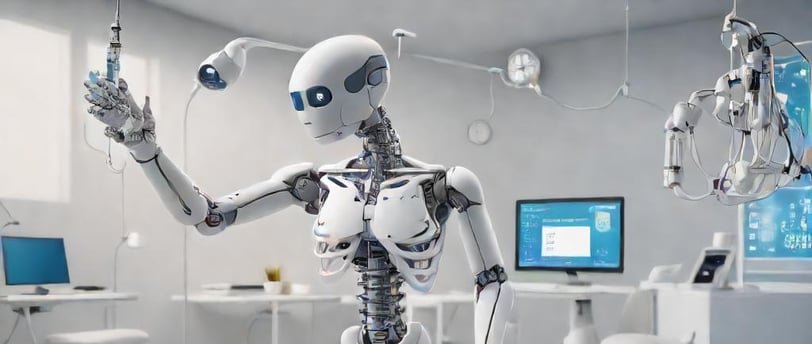How AI is Transforming Healthcare: Impact and Benefits
Discover how artificial intelligence is revolutionizing healthcare with improved diagnostics, personalized treatments, and enhanced patient care. Explore the key benefits of AI in the medical industry.
BLOG


How AI is Transforming the Healthcare Industry
Artificial intelligence has sparked a revolutionary transformation in the healthcare sector. The impact of artificial intelligence on healthcare is already evident as it enhances patient care and accelerates medical research. AI-driven personalized treatment plans, for example, are leading to more accurate diagnoses and improved health outcomes. By rapidly analyzing vast quantities of clinical data, AI enables medical professionals to identify disease markers and trends with unprecedented speed and precision.
The scope of AI in healthcare is broad, encompassing everything from evaluating radiological images for early disease detection to predicting patient outcomes using electronic health records. These advancements have resulted in smarter, faster, and more efficient healthcare processes, which can provide optimal care to millions worldwide. Healthcare providers, insurers, and life sciences companies are already leveraging AI technology to reap numerous benefits, streamlining development within the industry.
Medical Research and AI
AI plays a crucial role in expediting the drug discovery process by analyzing vast amounts of chemical compounds and identifying those with potential therapeutic benefits. Through machine learning algorithms, researchers can predict the success rate of these compounds without the need for laborious and time-consuming experimentation. This significantly shortens the drug development timeline, increasing the chances of discovering new treatments for various ailments.
In addition, AI-powered tools streamline medicine development by analyzing lab results, patient records, and clinical trial outcomes. Artificial intelligence in medical research can uncover effective treatment methods by detecting patterns that may not be apparent to researchers or doctors. This ultimately contributes to a better understanding of diseases and their underlying molecular mechanisms, potentially leading to preventive measures and more effective treatments.
Enhancing Medical Imaging Analysis with AI
AI significantly improves medical imaging analysis by quickly and accurately detecting anomalies in MRI scans, X-rays, and CT scans. This technology allows radiologists to identify potentially life-threatening issues much faster than traditional manual methods. Moreover, AI algorithms can reduce the possibility of human error, ultimately improving diagnostic accuracy and patient outcomes. AI's role in enhancing medical imaging is a prime example of how artificial intelligence is transforming healthcare diagnostics.
Revolutionizing Diagnosis and Treatment
Healthcare AI has the potential to revolutionize diagnosis and treatment analysis by offering clinicians data-driven insights that were previously unimaginable. By analyzing vast amounts of patient data, machine learning algorithms can identify patterns and correlations that might be difficult or impossible for human experts to detect. This enables more accurate and timely diagnoses, as well as personalized treatment plans tailored to each patient's unique characteristics.
Furthermore, AI tools can assess the effectiveness of treatments and suggest adjustments in real time, leading to improved clinical outcomes and reduced healthcare costs. The role of AI in healthcare extends to automating mundane administrative tasks, freeing up time for medical professionals to focus on direct patient care. Predictive analysis, powered by AI, uses historical data—including patients' medical history and real-time health information—to forecast potential outcomes. This allows healthcare providers to intervene early and prevent complications.
Improving Patient Experience with AI
The integration of AI into healthcare also greatly enhances the patient experience. AI-powered tools streamline appointment scheduling, provide remote monitoring solutions, and offer personalized treatment plans based on individual medical records. Chatbots, for instance, can respond to routine medical inquiries and provide guidance on when patients should seek professional care. This not only minimizes stress but also saves time for both patients and healthcare providers.
At the HIMSS conference in March 2023, industry leaders discussed AI's role in bringing affordable healthcare to the doorsteps of individuals living in areas with poorly equipped health care systems. Today, smartphones equipped with electrocardiogram and ultrasound functionalities are being used in impoverished areas for diagnostic purposes, demonstrating how AI can expand healthcare access. By improving patient care and broadening access to medical services, AI is making a significant impact on global healthcare.
Conclusion
The impact of artificial intelligence on healthcare is profound and far-reaching. As AI continues to evolve, its applications in the healthcare sector will grow even more diverse and impactful. From AI-enhanced patient experiences to AI-driven personalized treatment plans, the healthcare industry is on the brink of a new era—one where technology and human expertise work hand in hand to improve patient outcomes, reduce costs, and expand access to quality care.
